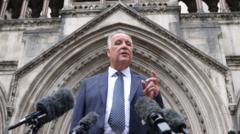How Did Ex-Actor Polanski Land a Top Green Job?

Published: 2025-09-02 13:56:04 | Category: sport
Zack Polanski has emerged victorious as the new leader of the Green Party, promoting a platform centred around bold communication and a concept he terms "eco-populism". His leadership marks a decisive shift as he aims to challenge the Labour Party directly, stating, "We are here to replace you." Although Polanski is well-known within the London Assembly, he remains relatively unfamiliar to the broader public. This article delves into his background, leadership vision, and the implications of his election for the Green Party and UK politics.
Last updated: 09 October 2023 (BST)
Key Takeaways
- Zack Polanski has been elected as the new leader of the Green Party, advocating for an eco-populist agenda.
- His leadership approach aims to challenge Labour on issues like inequality and climate action.
- Polanski has a diverse background, previously working as an actor and mental health counsellor.
- The election of Polanski might lead to potential alliances with emerging left-wing parties.
- His election sets the stage for a reevaluation of Green Party strategies leading up to the next general election in 2029.
Zack Polanski: A New Era for the Green Party
Zack Polanski's ascent to the Green Party leadership represents a significant turning point for the party. With a commitment to "eco-populism", he intends to reshape how the Greens communicate their message and engage with the electorate. His victory has been viewed as a break from the more moderate approach of his predecessors, aligning instead with a vision that seeks to invigorate the party's grassroots support and broaden its appeal.
Background and Political Journey
Born in 1982 in Salford, Polanski's early life was marked by a commitment to social justice. He initially joined the Liberal Democrats, where he felt his leftist ideals were not fully represented. After unsuccessful bids for Camden Council and the London Assembly, he joined the Green Party in 2017, quickly rising through the ranks to become deputy leader by 2022.
Polanski's diverse career has included roles as an actor, hypnotherapist, and mental health counsellor. This varied background has contributed to his unique perspective on politics, emphasising the importance of mental health and well-being within the framework of social justice.
Eco-Populism: A Bold New Direction
Polanski's leadership campaign has been characterised by his advocacy for "eco-populism", which intertwines ecological concerns with social equity. He argues that the climate crisis is intrinsically linked to issues of inequality and that tackling one necessitates addressing the other. His vision involves mobilising grassroots support to create a mass movement aimed at radical change in environmental policies.
In his view, the Green Party must adopt a more assertive stance, particularly in its communications strategy. He has praised the storytelling abilities of figures like Nigel Farage, suggesting that the Greens could benefit from similar techniques to engage a wider audience, including disillusioned voters from other parties.
Positioning Against Labour
In his victory speech, Polanski made it clear that he sees the Labour Party as a primary opponent. He aims to challenge Labour's policies on various fronts, particularly regarding inequality and climate action. His assertive stance includes a commitment to advocating for a Universal Basic Income, which he believes is essential in addressing economic disparities exacerbated by the climate crisis.
Polanski's determination to "take the fight to Labour" is a strategic move, positioning the Green Party as a viable alternative for voters seeking progressive solutions. This approach is likely to resonate with those who feel that Labour has strayed from its roots and is failing to adequately address pressing social and environmental issues.
Implications for the Green Party
The election of Polanski could significantly alter the landscape of the Green Party. His leadership style, which prioritises boldness and radical solutions, may alienate some members who prefer a more cautious approach. His predecessors, Adrian Ramsay and Ellie Chowns, who are viewed as continuity candidates, had successfully navigated the complexities of winning seats in traditionally Conservative areas.
Polanski's election raises questions about the party's future strategy and cohesion. While he has sought to reassure those who did not vote for him by emphasising democratic principles, the upcoming elections for the leadership of the party's parliamentary group will test the unity of the party's MPs.
Potential Alliances and Future Directions
Polanski's leadership may also pave the way for new alliances within the left-wing political spectrum. With the emergence of a new party led by former Labour leader Jeremy Corbyn, there is potential for collaboration aimed at challenging the current government. Though Polanski has stated that it is "too soon" to discuss forming electoral coalitions, he is open to working with any group focused on opposing what he describes as a "failing Labour government" and combating the rise of far-right ideologies.
Addressing Housing and Social Justice
Polanski's commitment to social justice extends to housing, where he advocates for decent, affordable homes for all. As a former renter and property guardian, he understands the challenges faced by many in securing adequate housing. His plans include a call for government action to ensure that housing is treated as a human right, emphasising the need for policies that prioritise vulnerable communities.
This focus on social justice, combined with his environmental agenda, positions Polanski's leadership as an opportunity for the Green Party to redefine its identity and appeal to a broader electorate.
Conclusion
As Zack Polanski embarks on his journey as the leader of the Green Party, he brings with him a vision that intertwines ecological responsibility with social equity. His election signifies a departure from the cautious strategies of the past and a commitment to bold, radical change. The coming years will reveal whether his approach can galvanise support and challenge the dominant political narratives in the UK.
With a focus on inequality, housing, and environmental action, Polanski's leadership marks a critical juncture for the Green Party. As they prepare for the next general election in 2029, the party's ability to unify its members and articulate a compelling vision will be paramount. How will Polanski's leadership shape the future of the Green Party and the broader political landscape in the UK? #GreenParty #ZackPolanski #EcoPopulism
FAQs
Who is Zack Polanski?
Zack Polanski is the newly elected leader of the Green Party, known for his advocacy of eco-populism and social justice, with a background in acting and mental health counselling.
What is eco-populism?
Eco-populism is a political approach that links environmental concerns with social justice, aiming to address climate change while tackling inequality and advocating for grassroots movements.
What are Polanski's plans for the Green Party?
Polanski plans to challenge the Labour Party on issues like inequality and climate action, promote a Universal Basic Income, and advocate for decent housing and environmental policies.
How does Polanski view alliances with other left-wing parties?
While he is open to potential alliances with emerging left-wing parties, Polanski states it is "too soon" to discuss formal electoral coalitions, focusing instead on growing the Green Party.
What challenges does Polanski face as the new leader?
Polanski faces the challenge of uniting the party following a divisive leadership election and navigating the balance between bold policies and electoral viability in the next general election.



